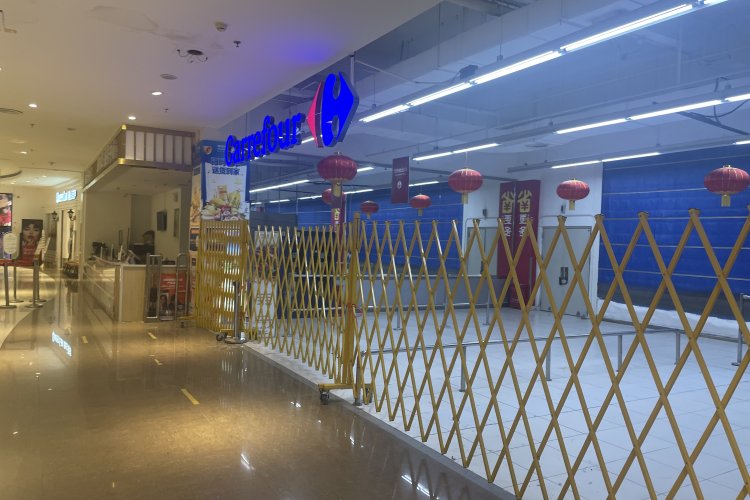Carrefour China Fights to Stay Relevant in an E-Commerce Dominated Market
Carrefour hasn't been doing too well in China, as of late, thanks to severe stock shortages and a number of other issues hitting the French grocery chain, according to a recent Beijing Times report. We paid a visit to two stores – the Shuangjing branch in Beijing and a store in Guangqumen – to gain a better understanding of the situation.
While most essential items like body care products and tissues were in good supply at both locations, shelves were almost completely devoid of fresh produce such as vegetables and fruits, as well as meat products. According to a customer at the Shuangjing branch, this situation had been ongoing for the past three to four weeks.
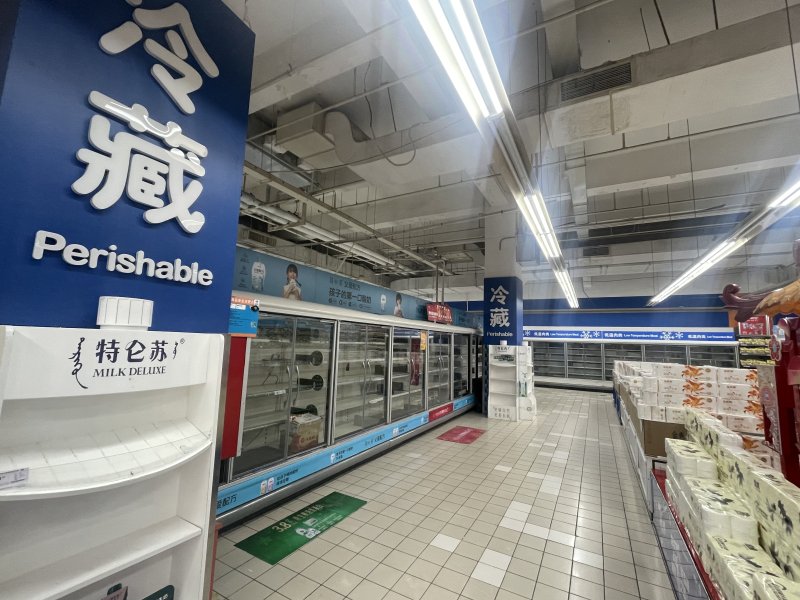
When approached for comment, one Carrefour employee at the Shuangjing branch stated the company is actively replenishing supplies in the Beijing market and that the situation should return to normal in a month and a half. "The Shuangjing store is undergoing a major renovation.Prior to the changes, the second floor was entirely occupied by Carrefour's products and half of the third floor was dedicated to Suning's products" she explained to us. "However, all Carrefour's products on the third floor have now been shifted to the second floor, leaving the third floor empty and allowing Suning to move into the space. "

According to the Beijing Times, the supply shortage is largely due to people with prepaid cards panic buying out of fear that they may not be able to spend the money saved in their cards if stores are closed.
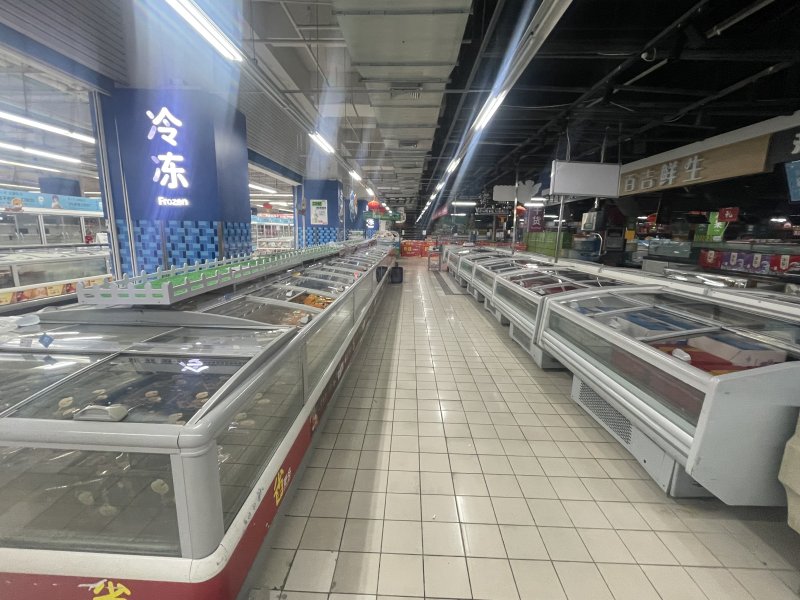
Moreover, we noticed that many products like snacks, beverages, and instant foods are labeled with bold characters that read 福气心选 fúqi xīn xuǎn (which roughly translates to mean "select products"), which cannot be purchased using prepaid shopping cards, causing further concerns among customers.
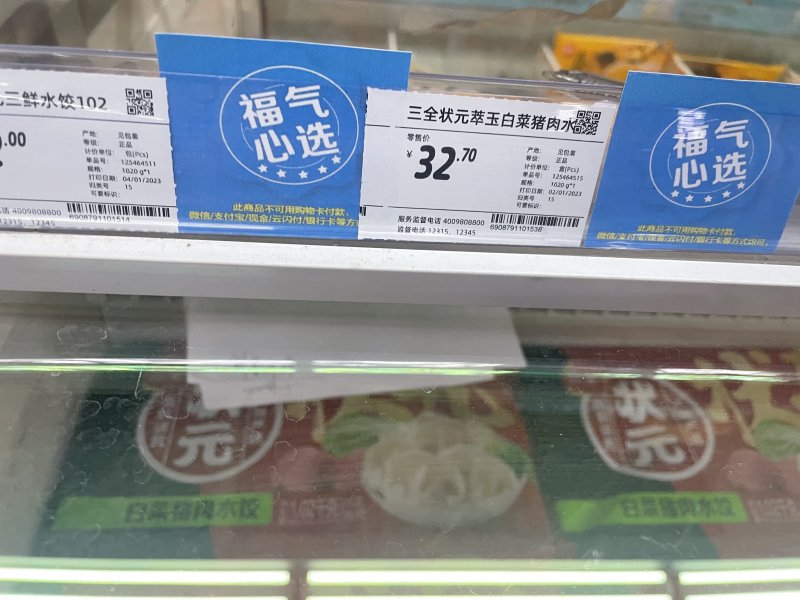
On Monday night, a Beijing resident we spoke to ventured to the supermarket with the intention of making the most of her shopping card. After a long four-hour wait at the checkout counter, she was disappointed to find that the available items she could purchase were quite limited, and ended up settling for just a few bottles of wine and some kitchenware.
“The supermarket was overwhelmingly crowded with panicked shoppers like myself, and the shelves were almost completely empty. Even with shopping cards, it was nearly impossible to buy the most basic of necessities, such as milk and snacks" she told us.

In response to shortages and other issues, Carrefour China recently announced that, due to the impact of the pandemic and strategic shifts, as well as rumors of the retailer's potential exit, they have implemented temporary limits on the use of shopping cards.
All of this comes as Carrefour has seen a significant decrease in their business, closing 54 stores during the first three quarters of 2022, leaving only 151 stores in operation. As such, Carrefour is currently in the midst of a period of restructuring and reorganizing.
Looking back just a few decades, many would not have thought that the decline of business in Carrefour would be within the realm of possibility. When the first Carrefour store opened at the China International Exhibition Center in Chaoyang District, Beijing on Christmas day in 1995, it was met with unprecedented success. Customers were drawn by the lower prices, with fresh juices available for half the price of those in grocery stores and a kilogram of bread being 2 RMB cheaper than in local shops. As one might expect, Carrefour quickly rose to prominence and by 2017, there were 321 stores in China, with sales of RMB 49.8 billion in 2017 alone.

However, the traditional retail market was shaken once more with the rapidly booming growth of e-commerce in the Chinese market in recent years. Top e-commerce competitors like Tmall and Jingdong have enabled shoppers to purchase anything from supermarkets with even greater efficiency and lower costs.
Recent data from Tmall shows sales volume over the Double Eleven Holiday, the Chinese version of Black Friday, have been steadily increasing over the past four years. In 2020, transactions skyrocketed, almost doubling the amount from the previous year. By 2021, the total sales volume is expected to reach 540.3 billion yuan, representing a remarkable growth rate of 8.45 percent. Such prevalence of e-commerce purchases in China over traditional brick-and-mortar stores has led to a decrease in Carrefour's store visits and sales.
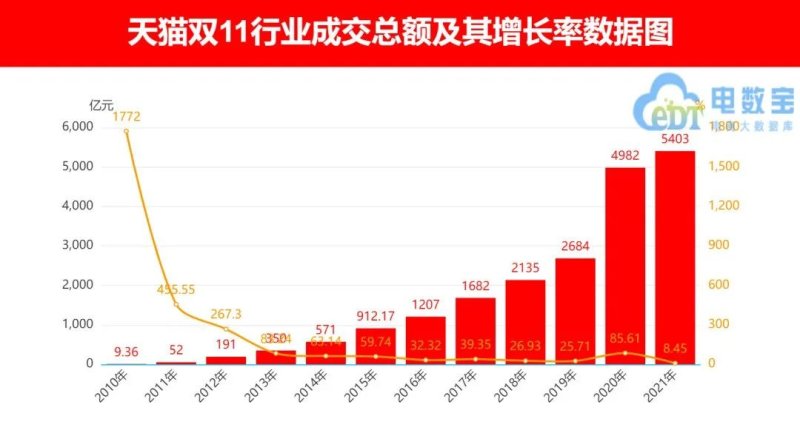
Moreover, Chinese consumer behavior is ever-changing, as more and more are choosing to purchase fresh items from specialty stores in their nearby communities, rather than frozen products found in hypermarkets (larger stores selling a wider range of products than a traditional grocery store). This presents a unique opportunity for stores like Yonghui Supermarket and Hema Fresh -- both places are known for their fresh produce and proximity to the neighborhood -- to capitalize on the trend.
In March, Carrefour is launching a revolutionary transformation for its hypermarkets in major cities such as Beijing and Shanghai. These stores will focus on providing a variety of services and experiences to their local communities, ranging from children's play facilities to catering services. The shift will be designed to attract more visits and increase the engagement Carrefour China has with its consumers.
“We have been in the Chinese market for 28 years, which has seen tremendous growth in the retail industry and changes in consumer demands" Carrefour China said in a recent Global Times report. "We have been part of the development that has come with these advances and will continue to explore this market, providing the best service possible.”
READ: An Ode to Beijing Subway Adverts
Images: Irene Li, 魔方电商
Related stories :
Comments
New comments are displayed first.Comments
![]() BauLuo
Submitted by Guest on Sat, 02/25/2023 - 15:44 Permalink
BauLuo
Submitted by Guest on Sat, 02/25/2023 - 15:44 Permalink
Re: Carrefour China Fights to Stay Relevant in an E-Commerce...
Well on the one hand, ya gots the Angles, direct descendants of Pythhagoras, good at geometry and such. Then ya gots the Saxophonists, .... they liked singing an artsy stuff and so on. Now on the boats outa northern Germany an Denmark, sometimes people would lose ther' ticket, a boat would sink and etc. So turns out these people would be all commingled , Angles funking Saxaphonist, Saxaphonists funkin with any thing with a hole. That kep the ships afloat all the way to Londinium. Hence the English race.yeah, I know. `at that point in time= then' `at this point in time' = now. Good old Anglo-Saxon words, no fuckin around. But there are people with too much to say, but nothing to say. I value precision and succinctness in speech; not all the the time though, cuz sometimes yer just goofin off.While most essential items like body care products and tissues were in good supply at both locations, shelves were almost completely devoid of fresh produce such as vegetables and fruits, as well as meat products.(UNQUOTE)
So...body care products are "essential"; veggies and meat are not? Um...tell me, what color is the sky on your planet?
Helpful hint, too: just say "meat." Saying "meat product" makes you come off as a wanker trying to sound intelligent. Like the wonk mama telling her kid, "At this point in time, it's bedtime."
Um...shouldn't we be calling words "lexiographical products"? Be careful, too. The Smithsonianmag.com talks about how "Anglo-Saxon" is linked to hate speech since the peoples of early England did not use the word.
Now the Jutes, thass another story. They had to turn themselves inta mollusks and hope they wunt get scraped offa the bow.
![]() BauLuo
Submitted by Guest on Fri, 02/24/2023 - 19:23 Permalink
BauLuo
Submitted by Guest on Fri, 02/24/2023 - 19:23 Permalink
Re: Carrefour China Fights to Stay Relevant in an E-Commerce...
yeah, I know. `at that point in time= then' `at this point in time' = now. Good old Anglo-Saxon words, no fuckin around. But there are people with too much to say, but nothing to say. I value precision and succinctness in speech; not all the the time though, cuz sometimes yer just goofin off.While most essential items like body care products and tissues were in good supply at both locations, shelves were almost completely devoid of fresh produce such as vegetables and fruits, as well as meat products.(UNQUOTE)
So...body care products are "essential"; veggies and meat are not? Um...tell me, what color is the sky on your planet?
Helpful hint, too: just say "meat." Saying "meat product" makes you come off as a wanker trying to sound intelligent. Like the wonk mama telling her kid, "At this point in time, it's bedtime."
Validate your mobile phone number to post comments.



